
With native support for a 128K token context window, function calling, and robust tool usage, GPT-4.1 brings AI closer to behaving like a reliable, adaptive assistant—ready to work, build, and collaborate across tasks with speed and precision.
- Software Engineers: Build smarter apps, code assistants, and debuggers with GPT-4.1’s powerful reasoning and tool-calling abilities.
- Product Teams & Startups: Create responsive and intelligent AI features across web and mobile platforms.
- Researchers & Analysts: Summarize papers, analyze large datasets, and interact with data in natural language.
- Educators & EdTech Providers: Power AI tutors, generate quizzes, and explain concepts with clarity and accuracy.
- Customer Support & CX Teams: Deploy chatbots and assistants that understand context, follow instructions, and offer accurate help.
- Writers & Content Teams: Use GPT-4.1 to ideate, draft, and refine content with improved coherence and tone control.
🛠️ How to Use GPT-4.1?
- Step 1: Access the OpenAI API: Log in to the OpenAI Platform and select GPT-4.1 via the Playground or API.
- Step 2: Choose the Model ID: Use gpt-4-1106-preview or any new model ID associated with GPT-4.1 (based on OpenAI’s rollout naming).
- Step 3: Set Up Your Prompt or System Message: Define clear goals, roles, or instructions to align the assistant’s behavior with your task.
- Step 4: Use Tools (Optional): Enable tools like the code interpreter, retrieval plugins, or image input support, depending on your use case.
- Step 5: Generate & Analyze Output: Let GPT-4.1 complete tasks, generate responses, or process inputs with improved speed and contextual awareness.
- Step 6: Integrate into Workflow: Use API endpoints, Assistants API, or platform SDKs to embed GPT-4.1 into your apps or pipelines.
- 128K Context Window: Handle longer documents, richer chats, and deep contextual tasks effortlessly.
- Multimodal Input Support: Understands text, code, and images (API availability depends on use case).
- Improved Tool Use: Native support for function calling, code execution, file analysis, and web browsing (when tools are enabled).
- High Factual Accuracy: Significant reduction in hallucinations and better adherence to instructions.
- Memory-Ready Architecture: Structured to support memory and assistant-based use cases (with evolving support from OpenAI).
- Smarter Reasoning: Handles complex, multi-step problems better than previous models, especially in math, coding, and logic-heavy scenarios.
- Massive Context Memory: 128K tokens open up longer workflows, deeper analysis, and uninterrupted chats.
- Excellent Reasoning Capabilities: Especially good with logic, math, and structured decision-making.
- Tool Usage Built-In: Makes code execution, image handling, and function calling seamless.
- ]Fewer Hallucinations: One of the most accurate models to date in terms of factual output.
- Fast and Cost-Effective (via Turbo): Delivers impressive performance with reasonable pricing.
- Model Access May Be Limited: Full GPT-4.1 capability might be gated or reserved for API partners or enterprise use.
- Lack of Transparency: Still no public information on parameters or model architecture.
- Requires Structured Setup for Tools: Tooling (e.g. code interpreter) needs additional integration work.
- Overconfidence in Edge Cases: Can still hallucinate or fabricate facts if not properly prompted.
- Not Fully Available in All Products: Some capabilities may be tied to the Assistants API or not directly in ChatGPT.
Plus
$ 20.00
Pro
$ 200.00
API
$2/$8
Proud of the love you're getting? Show off your AI Toolbook reviews—then invite more fans to share the love and build your credibility.
Add an AI Toolbook badge to your site—an easy way to drive followers, showcase updates, and collect reviews. It's like a mini 24/7 billboard for your AI.
Reviews
Rating Distribution
Average score
Popular Mention
FAQs
Similar AI Tools

OpenAI’s Real-Time API is a game-changing advancement in AI interaction, enabling developers to build apps that respond instantly—literally in milliseconds—to user inputs. It drastically reduces the response latency of OpenAI’s GPT-4o model to as low as 100 milliseconds, unlocking a whole new world of AI-powered experiences that feel more human, responsive, and conversational in real time. Whether you're building a live voice assistant, a responsive chatbot, or interactive multiplayer tools powered by AI, this API puts real in real-time AI.


OpenAI Realtime AP..
OpenAI’s Real-Time API is a game-changing advancement in AI interaction, enabling developers to build apps that respond instantly—literally in milliseconds—to user inputs. It drastically reduces the response latency of OpenAI’s GPT-4o model to as low as 100 milliseconds, unlocking a whole new world of AI-powered experiences that feel more human, responsive, and conversational in real time. Whether you're building a live voice assistant, a responsive chatbot, or interactive multiplayer tools powered by AI, this API puts real in real-time AI.


OpenAI Realtime AP..
OpenAI’s Real-Time API is a game-changing advancement in AI interaction, enabling developers to build apps that respond instantly—literally in milliseconds—to user inputs. It drastically reduces the response latency of OpenAI’s GPT-4o model to as low as 100 milliseconds, unlocking a whole new world of AI-powered experiences that feel more human, responsive, and conversational in real time. Whether you're building a live voice assistant, a responsive chatbot, or interactive multiplayer tools powered by AI, this API puts real in real-time AI.


OpenAI o1-pro
o1-pro is a highly capable AI model developed by OpenAI, designed to deliver efficient, high-quality text generation across a wide range of use cases. As part of OpenAI’s GPT-4 architecture family, o1-pro is optimized for low-latency performance and high accuracy—making it suitable for both everyday tasks and enterprise-scale applications. It powers natural language interactions, content creation, summarization, and more, offering developers a solid balance between performance, cost, and output quality.


OpenAI o1-pro
o1-pro is a highly capable AI model developed by OpenAI, designed to deliver efficient, high-quality text generation across a wide range of use cases. As part of OpenAI’s GPT-4 architecture family, o1-pro is optimized for low-latency performance and high accuracy—making it suitable for both everyday tasks and enterprise-scale applications. It powers natural language interactions, content creation, summarization, and more, offering developers a solid balance between performance, cost, and output quality.


OpenAI o1-pro
o1-pro is a highly capable AI model developed by OpenAI, designed to deliver efficient, high-quality text generation across a wide range of use cases. As part of OpenAI’s GPT-4 architecture family, o1-pro is optimized for low-latency performance and high accuracy—making it suitable for both everyday tasks and enterprise-scale applications. It powers natural language interactions, content creation, summarization, and more, offering developers a solid balance between performance, cost, and output quality.


OpenAI GPT 4.1 nan..
GPT-4.1 Nano is OpenAI’s smallest and most efficient language model in the GPT-4.1 family, designed to deliver ultra-fast, ultra-cheap, and surprisingly capable natural language responses. Though compact in size, GPT-4.1 Nano handles lightweight NLP tasks with impressive speed and minimal resource consumption, making it perfect for mobile apps, edge computing, and large-scale deployments with cost sensitivity. It’s built for real-time applications and use cases where milliseconds matter, and budgets are tight—yet you still want a taste of OpenAI-grade intelligence.


OpenAI GPT 4.1 nan..
GPT-4.1 Nano is OpenAI’s smallest and most efficient language model in the GPT-4.1 family, designed to deliver ultra-fast, ultra-cheap, and surprisingly capable natural language responses. Though compact in size, GPT-4.1 Nano handles lightweight NLP tasks with impressive speed and minimal resource consumption, making it perfect for mobile apps, edge computing, and large-scale deployments with cost sensitivity. It’s built for real-time applications and use cases where milliseconds matter, and budgets are tight—yet you still want a taste of OpenAI-grade intelligence.


OpenAI GPT 4.1 nan..
GPT-4.1 Nano is OpenAI’s smallest and most efficient language model in the GPT-4.1 family, designed to deliver ultra-fast, ultra-cheap, and surprisingly capable natural language responses. Though compact in size, GPT-4.1 Nano handles lightweight NLP tasks with impressive speed and minimal resource consumption, making it perfect for mobile apps, edge computing, and large-scale deployments with cost sensitivity. It’s built for real-time applications and use cases where milliseconds matter, and budgets are tight—yet you still want a taste of OpenAI-grade intelligence.


OpenAI GPT 4o mini..
GPT-4o Mini Realtime Preview is a lightweight, high-speed variant of OpenAI’s flagship multimodal model, GPT-4o. Built for blazing-fast, cost-efficient inference across text, vision, and voice inputs, this preview version is optimized for real-time responsiveness—without compromising on core intelligence. Whether you’re building chatbots, interactive voice tools, or lightweight apps, GPT-4o Mini delivers smart performance with minimal latency and compute load. It’s the perfect choice when you need responsiveness, affordability, and multimodal capabilities all in one efficient package.


OpenAI GPT 4o mini..
GPT-4o Mini Realtime Preview is a lightweight, high-speed variant of OpenAI’s flagship multimodal model, GPT-4o. Built for blazing-fast, cost-efficient inference across text, vision, and voice inputs, this preview version is optimized for real-time responsiveness—without compromising on core intelligence. Whether you’re building chatbots, interactive voice tools, or lightweight apps, GPT-4o Mini delivers smart performance with minimal latency and compute load. It’s the perfect choice when you need responsiveness, affordability, and multimodal capabilities all in one efficient package.


OpenAI GPT 4o mini..
GPT-4o Mini Realtime Preview is a lightweight, high-speed variant of OpenAI’s flagship multimodal model, GPT-4o. Built for blazing-fast, cost-efficient inference across text, vision, and voice inputs, this preview version is optimized for real-time responsiveness—without compromising on core intelligence. Whether you’re building chatbots, interactive voice tools, or lightweight apps, GPT-4o Mini delivers smart performance with minimal latency and compute load. It’s the perfect choice when you need responsiveness, affordability, and multimodal capabilities all in one efficient package.


OpenAI Codex mini ..
codex-mini-latest is OpenAI’s lightweight, high-speed AI coding model, fine-tuned from the o4-mini architecture. Designed specifically for use with the Codex CLI, it brings ChatGPT-level reasoning directly to your terminal, enabling efficient code generation, debugging, and editing tasks. Despite its compact size, codex-mini-latest delivers impressive performance, making it ideal for developers seeking a fast, cost-effective coding assistant.


OpenAI Codex mini ..
codex-mini-latest is OpenAI’s lightweight, high-speed AI coding model, fine-tuned from the o4-mini architecture. Designed specifically for use with the Codex CLI, it brings ChatGPT-level reasoning directly to your terminal, enabling efficient code generation, debugging, and editing tasks. Despite its compact size, codex-mini-latest delivers impressive performance, making it ideal for developers seeking a fast, cost-effective coding assistant.


OpenAI Codex mini ..
codex-mini-latest is OpenAI’s lightweight, high-speed AI coding model, fine-tuned from the o4-mini architecture. Designed specifically for use with the Codex CLI, it brings ChatGPT-level reasoning directly to your terminal, enabling efficient code generation, debugging, and editing tasks. Despite its compact size, codex-mini-latest delivers impressive performance, making it ideal for developers seeking a fast, cost-effective coding assistant.


OpenAI Omni Modera..
omni-moderation-latest is OpenAI’s most advanced content moderation model, designed to detect and flag harmful, unsafe, or policy-violating content across a wide range of modalities and languages. Built on the GPT-4o architecture, it leverages multimodal understanding and multilingual capabilities to provide robust moderation for text, images, and audio inputs. This model is particularly effective in identifying nuanced and culturally specific toxic content, including implicit insults, sarcasm, and aggression that general-purpose systems might overlook.


OpenAI Omni Modera..
omni-moderation-latest is OpenAI’s most advanced content moderation model, designed to detect and flag harmful, unsafe, or policy-violating content across a wide range of modalities and languages. Built on the GPT-4o architecture, it leverages multimodal understanding and multilingual capabilities to provide robust moderation for text, images, and audio inputs. This model is particularly effective in identifying nuanced and culturally specific toxic content, including implicit insults, sarcasm, and aggression that general-purpose systems might overlook.


OpenAI Omni Modera..
omni-moderation-latest is OpenAI’s most advanced content moderation model, designed to detect and flag harmful, unsafe, or policy-violating content across a wide range of modalities and languages. Built on the GPT-4o architecture, it leverages multimodal understanding and multilingual capabilities to provide robust moderation for text, images, and audio inputs. This model is particularly effective in identifying nuanced and culturally specific toxic content, including implicit insults, sarcasm, and aggression that general-purpose systems might overlook.
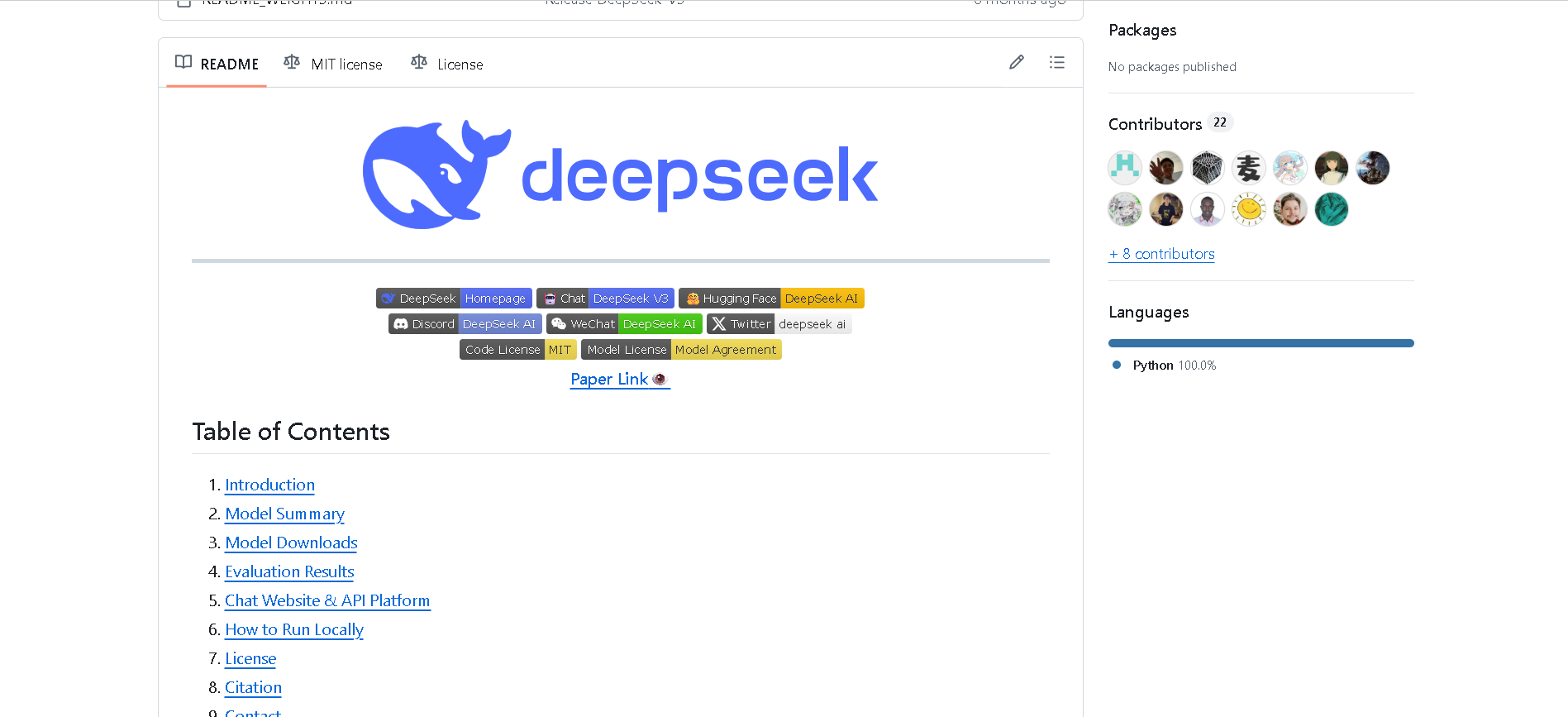

DeepSeek-V3
DeepSeek V3 is the latest flagship Mixture‑of‑Experts (MoE) open‑source AI model from DeepSeek. It features 671 billion total parameters (with ~37 billion activated per token), supports up to 128K context length, and excels across reasoning, code generation, language, and multimodal tasks. On standard benchmarks, it rivals or exceeds proprietary models—including GPT‑4o and Claude 3.5—as a high-performance, cost-efficient alternative.


DeepSeek-V3
DeepSeek V3 is the latest flagship Mixture‑of‑Experts (MoE) open‑source AI model from DeepSeek. It features 671 billion total parameters (with ~37 billion activated per token), supports up to 128K context length, and excels across reasoning, code generation, language, and multimodal tasks. On standard benchmarks, it rivals or exceeds proprietary models—including GPT‑4o and Claude 3.5—as a high-performance, cost-efficient alternative.


DeepSeek-V3
DeepSeek V3 is the latest flagship Mixture‑of‑Experts (MoE) open‑source AI model from DeepSeek. It features 671 billion total parameters (with ~37 billion activated per token), supports up to 128K context length, and excels across reasoning, code generation, language, and multimodal tasks. On standard benchmarks, it rivals or exceeds proprietary models—including GPT‑4o and Claude 3.5—as a high-performance, cost-efficient alternative.
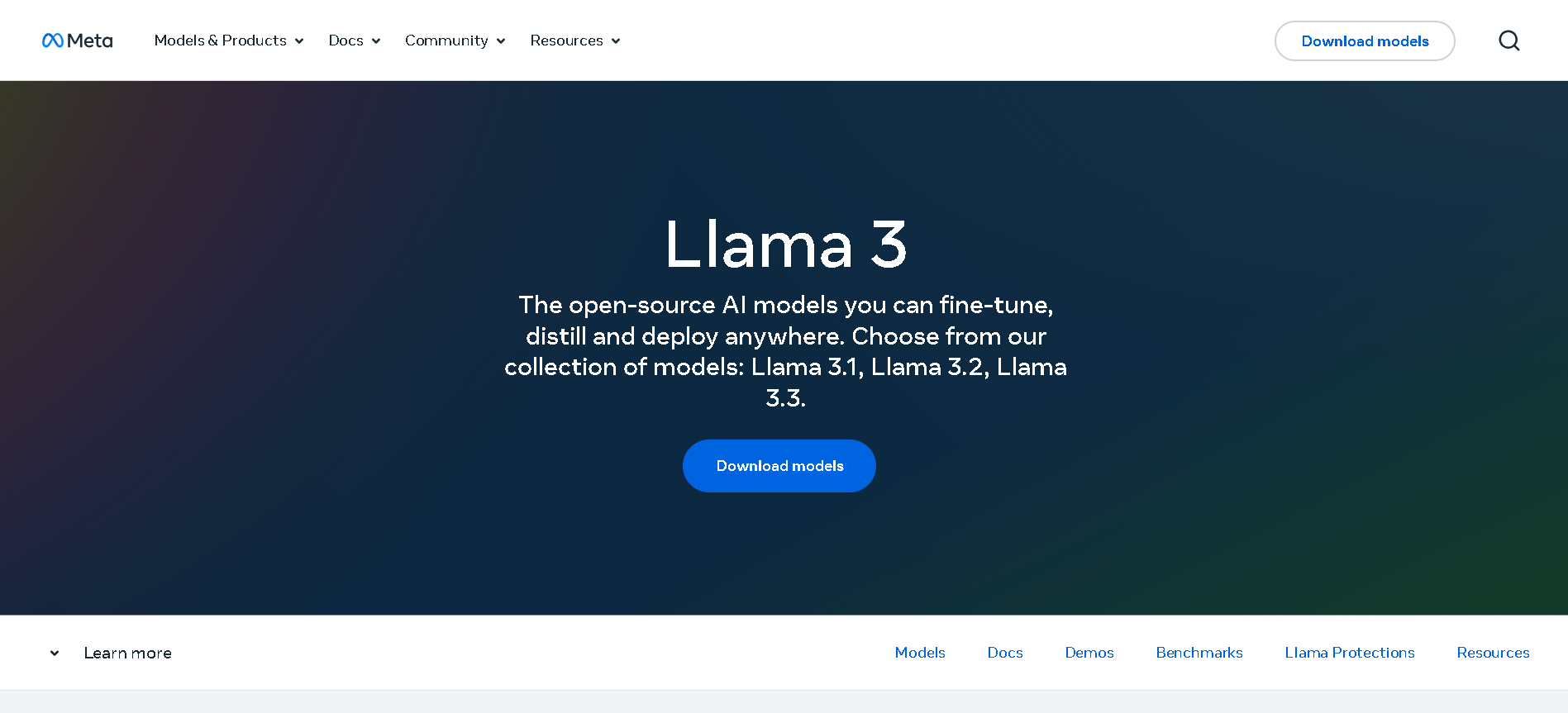

Meta Llama 3.2
Llama 3.2 is Meta’s multimodal and lightweight update to its Llama 3 line, released on September 25, 2024. The family includes 1B and 3B text-only models optimized for edge devices, as well as 11B and 90B Vision models capable of image understanding. It offers a 128K-token context window, Grouped-Query Attention for efficient inference, and opens up on-device, private AI with strong multilingual (e.g. Hindi, Spanish) support.


Meta Llama 3.2
Llama 3.2 is Meta’s multimodal and lightweight update to its Llama 3 line, released on September 25, 2024. The family includes 1B and 3B text-only models optimized for edge devices, as well as 11B and 90B Vision models capable of image understanding. It offers a 128K-token context window, Grouped-Query Attention for efficient inference, and opens up on-device, private AI with strong multilingual (e.g. Hindi, Spanish) support.


Meta Llama 3.2
Llama 3.2 is Meta’s multimodal and lightweight update to its Llama 3 line, released on September 25, 2024. The family includes 1B and 3B text-only models optimized for edge devices, as well as 11B and 90B Vision models capable of image understanding. It offers a 128K-token context window, Grouped-Query Attention for efficient inference, and opens up on-device, private AI with strong multilingual (e.g. Hindi, Spanish) support.
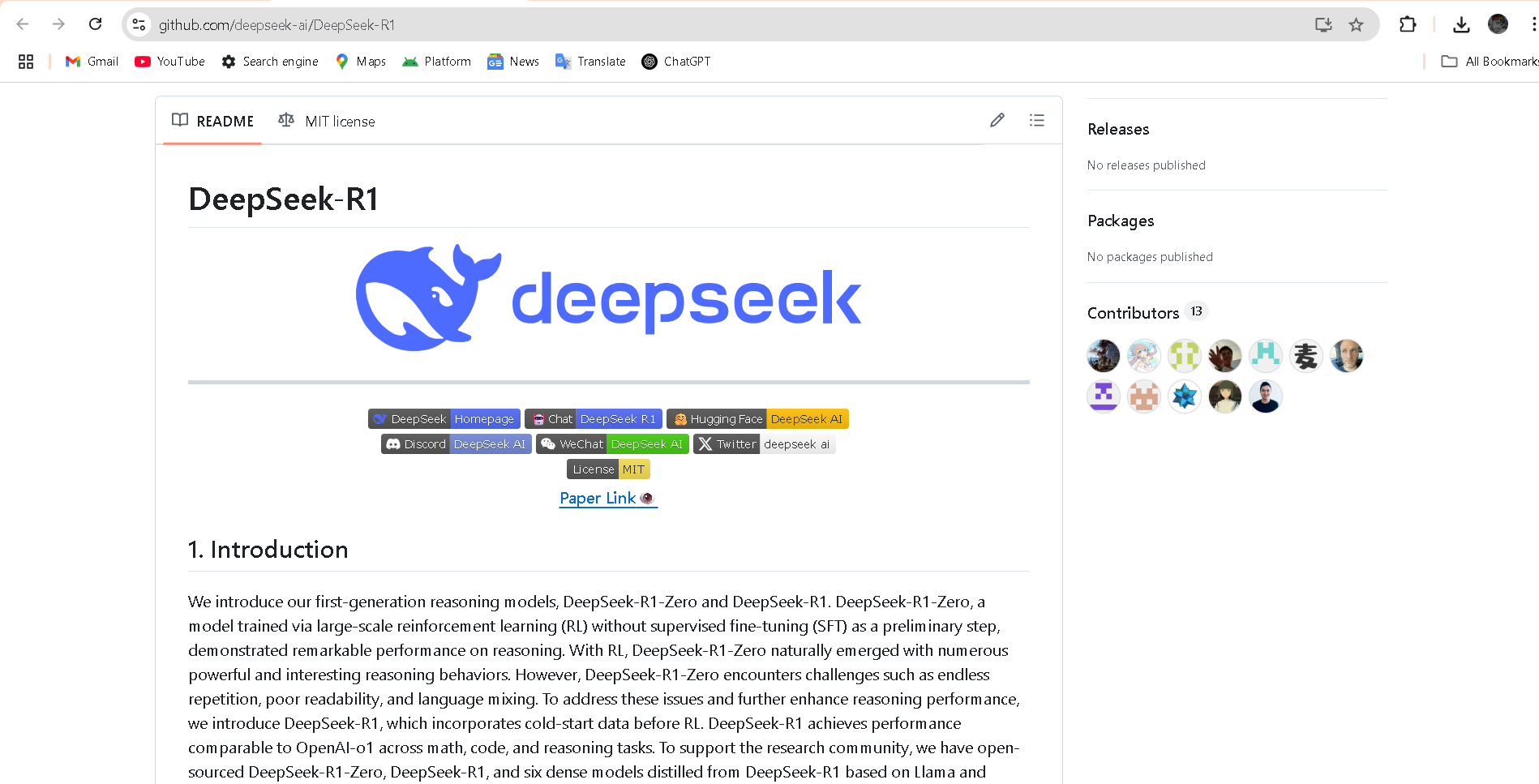

DeepSeek-R1-Distil..
DeepSeek R1 Distill refers to a family of dense, smaller models distilled from DeepSeek’s flagship DeepSeek R1 reasoning model. Released early 2025, these models come in sizes ranging from 1.5B to 70B parameters (e.g., DeepSeek‑R1‑Distill‑Qwen‑32B) and retain powerful reasoning and chain-of-thought abilities in a more efficient architecture. Benchmarks show distilled variants outperform models like OpenAI’s o1‑mini, while remaining open‑source under MIT license.


DeepSeek-R1-Distil..
DeepSeek R1 Distill refers to a family of dense, smaller models distilled from DeepSeek’s flagship DeepSeek R1 reasoning model. Released early 2025, these models come in sizes ranging from 1.5B to 70B parameters (e.g., DeepSeek‑R1‑Distill‑Qwen‑32B) and retain powerful reasoning and chain-of-thought abilities in a more efficient architecture. Benchmarks show distilled variants outperform models like OpenAI’s o1‑mini, while remaining open‑source under MIT license.


DeepSeek-R1-Distil..
DeepSeek R1 Distill refers to a family of dense, smaller models distilled from DeepSeek’s flagship DeepSeek R1 reasoning model. Released early 2025, these models come in sizes ranging from 1.5B to 70B parameters (e.g., DeepSeek‑R1‑Distill‑Qwen‑32B) and retain powerful reasoning and chain-of-thought abilities in a more efficient architecture. Benchmarks show distilled variants outperform models like OpenAI’s o1‑mini, while remaining open‑source under MIT license.
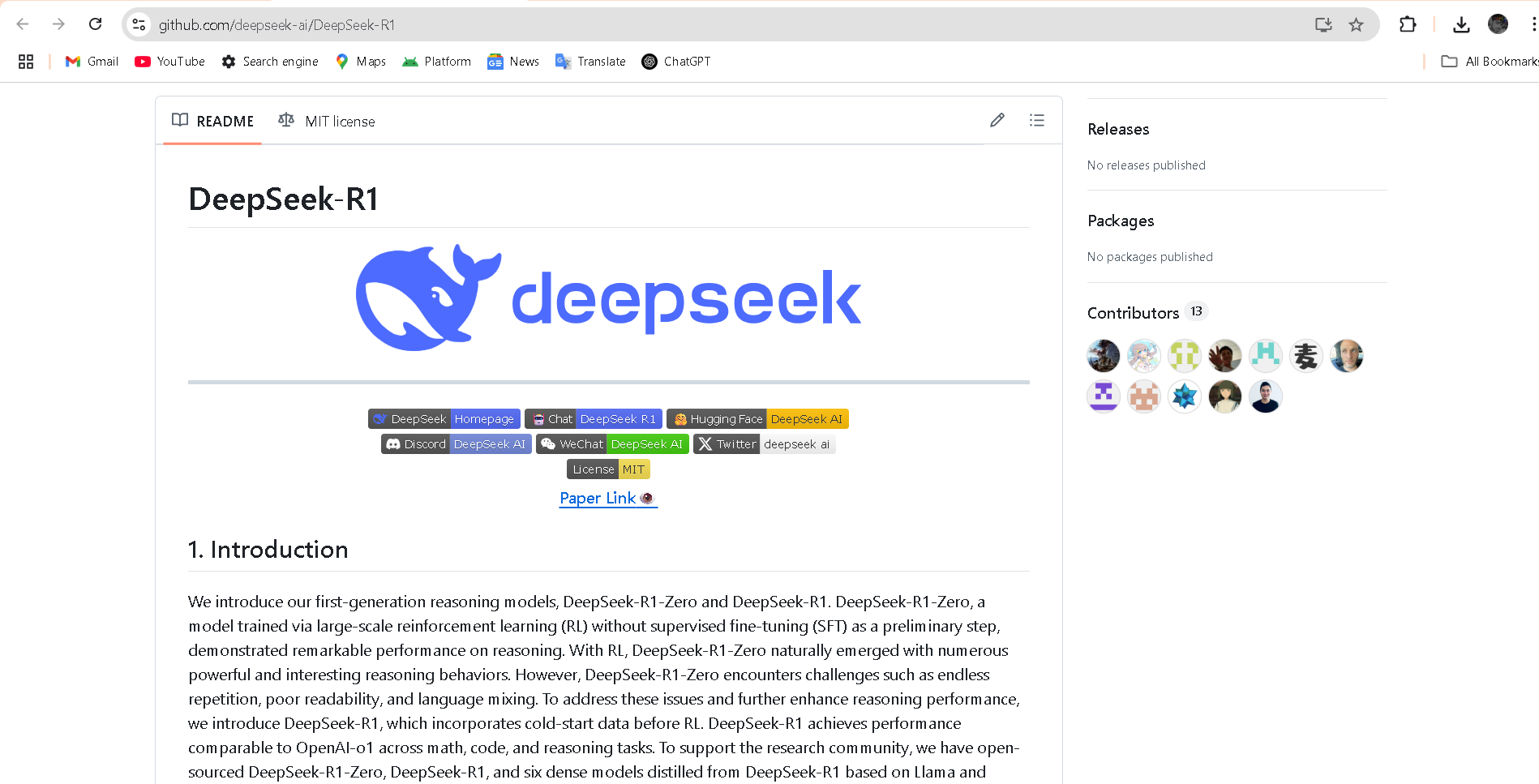

DeepSeek-R1-Distil..
DeepSeek R1 Distill Qwen‑32B is a 32-billion-parameter dense reasoning model released in early 2025. Distilled from the flagship DeepSeek R1 using Qwen 2.5‑32B as a base, it delivers state-of-the-art performance among dense LLMs—outperforming OpenAI’s o1‑mini on benchmarks like AIME, MATH‑500, GPQA Diamond, LiveCodeBench, and CodeForces rating.


DeepSeek-R1-Distil..
DeepSeek R1 Distill Qwen‑32B is a 32-billion-parameter dense reasoning model released in early 2025. Distilled from the flagship DeepSeek R1 using Qwen 2.5‑32B as a base, it delivers state-of-the-art performance among dense LLMs—outperforming OpenAI’s o1‑mini on benchmarks like AIME, MATH‑500, GPQA Diamond, LiveCodeBench, and CodeForces rating.


DeepSeek-R1-Distil..
DeepSeek R1 Distill Qwen‑32B is a 32-billion-parameter dense reasoning model released in early 2025. Distilled from the flagship DeepSeek R1 using Qwen 2.5‑32B as a base, it delivers state-of-the-art performance among dense LLMs—outperforming OpenAI’s o1‑mini on benchmarks like AIME, MATH‑500, GPQA Diamond, LiveCodeBench, and CodeForces rating.
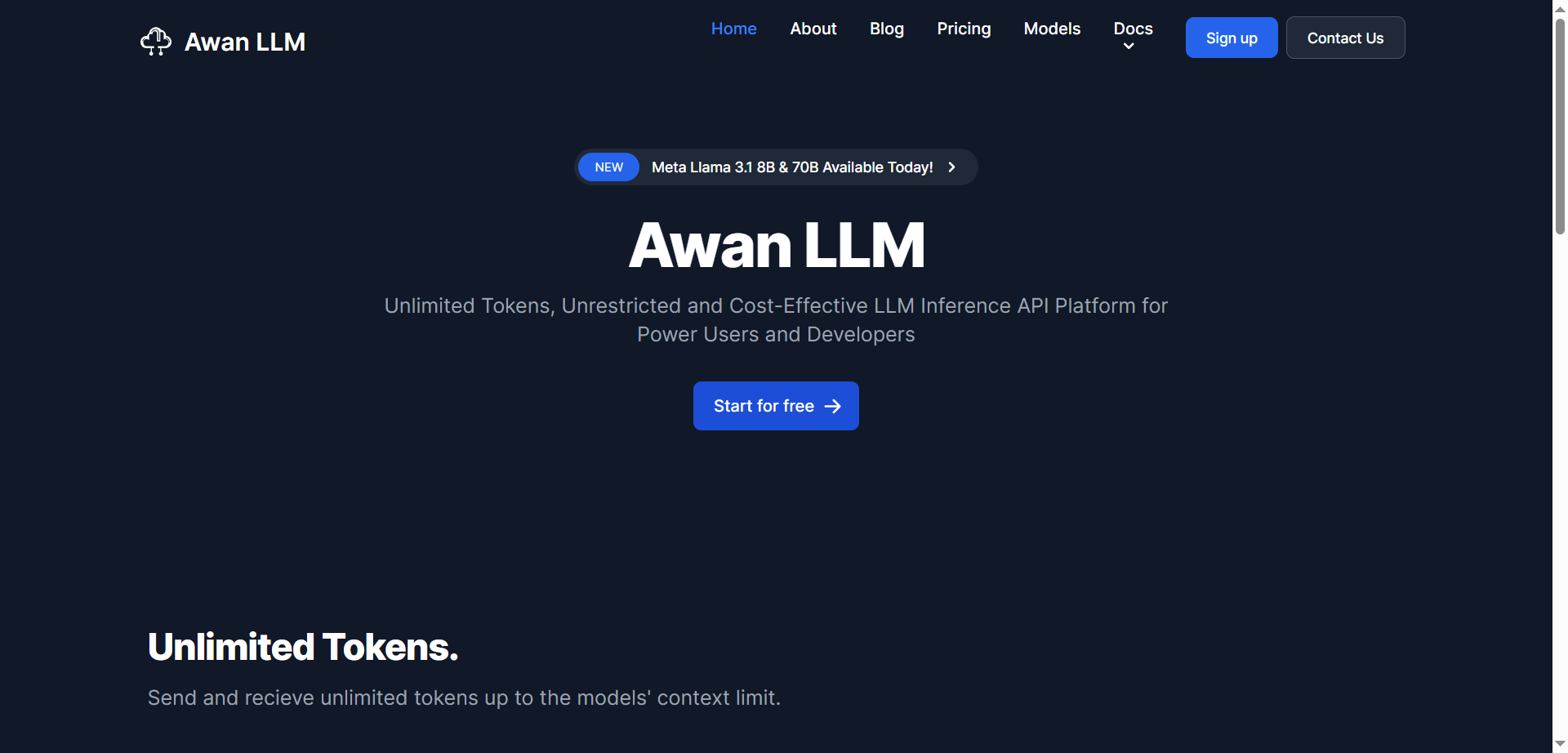
Awan LLM
Awan LLM is a cost-effective, unlimited token large language model inference API platform designed for power users and developers. Unlike traditional API providers that charge per token, Awan LLM offers a monthly subscription model that enables users to send and receive unlimited tokens up to the model's context limit. It supports unrestricted use of LLM models without censorship or constraints. The platform is built on privately owned data centers and GPUs, allowing it to offer efficient and scalable AI services. Awan LLM supports numerous use cases including AI assistants, AI agents, roleplaying, data processing, code completion, and building AI-powered applications without worrying about token limits or costs.

Awan LLM
Awan LLM is a cost-effective, unlimited token large language model inference API platform designed for power users and developers. Unlike traditional API providers that charge per token, Awan LLM offers a monthly subscription model that enables users to send and receive unlimited tokens up to the model's context limit. It supports unrestricted use of LLM models without censorship or constraints. The platform is built on privately owned data centers and GPUs, allowing it to offer efficient and scalable AI services. Awan LLM supports numerous use cases including AI assistants, AI agents, roleplaying, data processing, code completion, and building AI-powered applications without worrying about token limits or costs.

Awan LLM
Awan LLM is a cost-effective, unlimited token large language model inference API platform designed for power users and developers. Unlike traditional API providers that charge per token, Awan LLM offers a monthly subscription model that enables users to send and receive unlimited tokens up to the model's context limit. It supports unrestricted use of LLM models without censorship or constraints. The platform is built on privately owned data centers and GPUs, allowing it to offer efficient and scalable AI services. Awan LLM supports numerous use cases including AI assistants, AI agents, roleplaying, data processing, code completion, and building AI-powered applications without worrying about token limits or costs.
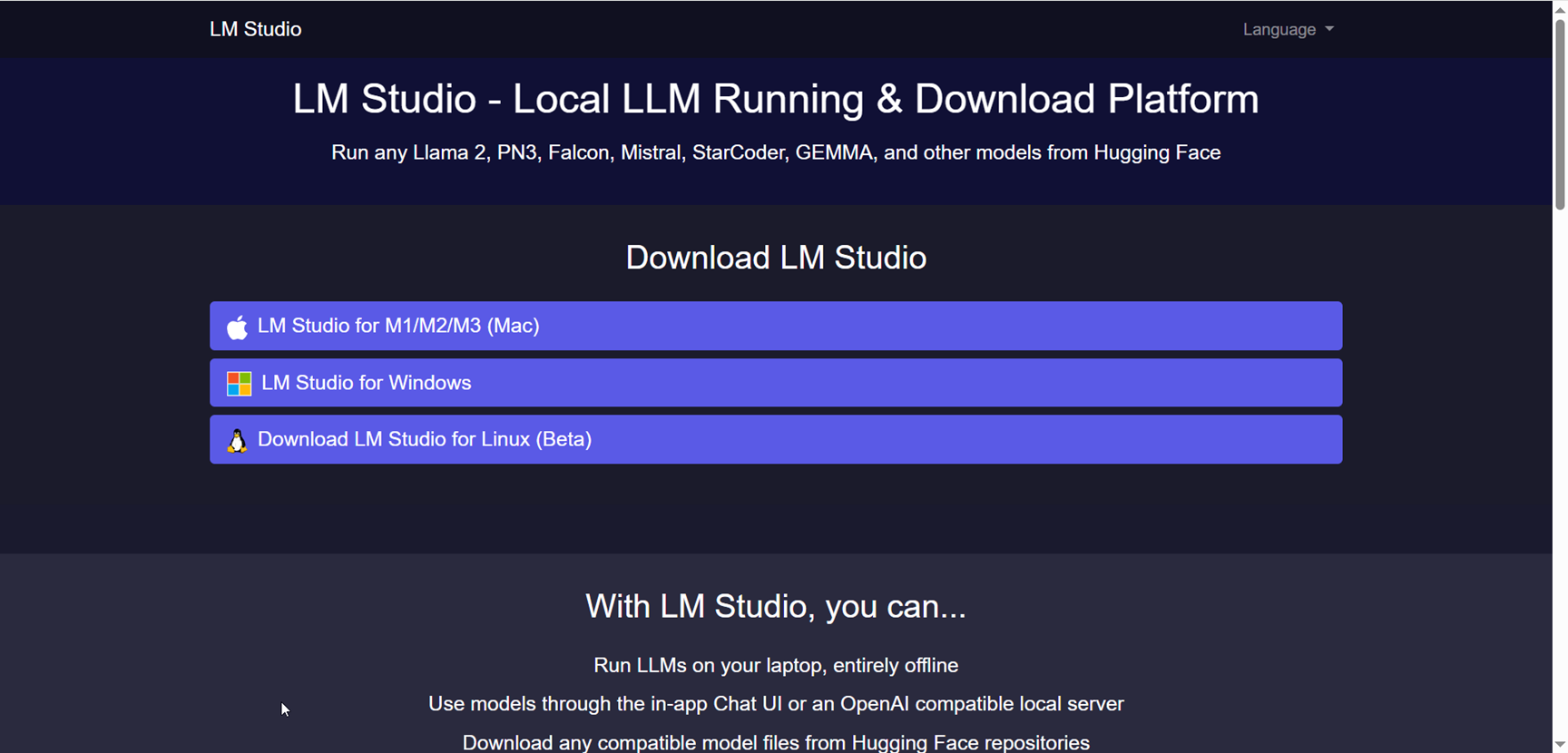
LM Studio
LM Studio is a local large language model (LLM) platform that enables users to run and download powerful AI language models like LLaMa, MPT, and Gemma directly on their own computers. This platform supports Mac, Windows, and Linux operating systems, providing flexibility to users across different devices. LM Studio focuses on privacy and control by allowing users to work with AI models locally without relying on cloud-based services, ensuring data stays on the user’s device. It offers an easy-to-install interface with step-by-step guidance for setup, facilitating access to advanced AI capabilities for developers, researchers, and AI enthusiasts without requiring an internet connection.

LM Studio
LM Studio is a local large language model (LLM) platform that enables users to run and download powerful AI language models like LLaMa, MPT, and Gemma directly on their own computers. This platform supports Mac, Windows, and Linux operating systems, providing flexibility to users across different devices. LM Studio focuses on privacy and control by allowing users to work with AI models locally without relying on cloud-based services, ensuring data stays on the user’s device. It offers an easy-to-install interface with step-by-step guidance for setup, facilitating access to advanced AI capabilities for developers, researchers, and AI enthusiasts without requiring an internet connection.

LM Studio
LM Studio is a local large language model (LLM) platform that enables users to run and download powerful AI language models like LLaMa, MPT, and Gemma directly on their own computers. This platform supports Mac, Windows, and Linux operating systems, providing flexibility to users across different devices. LM Studio focuses on privacy and control by allowing users to work with AI models locally without relying on cloud-based services, ensuring data stays on the user’s device. It offers an easy-to-install interface with step-by-step guidance for setup, facilitating access to advanced AI capabilities for developers, researchers, and AI enthusiasts without requiring an internet connection.
Editorial Note
This page was researched and written by the ATB Editorial Team. Our team researches each AI tool by reviewing its official website, testing features, exploring real use cases, and considering user feedback. Every page is fact-checked and regularly updated to ensure the information stays accurate, neutral, and useful for our readers.
If you have any suggestions or questions, email us at hello@aitoolbook.ai
